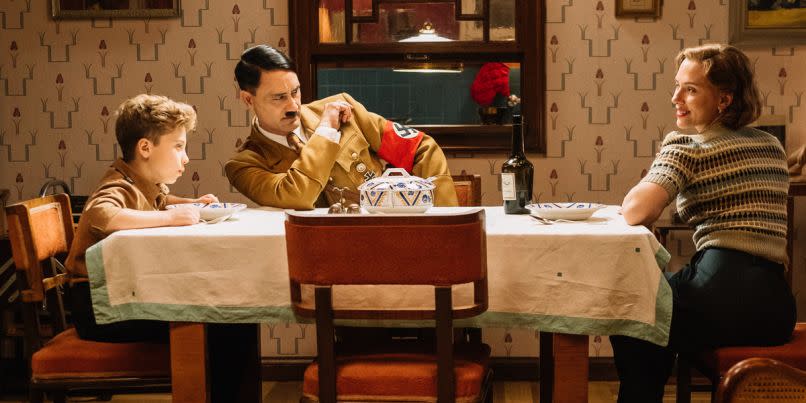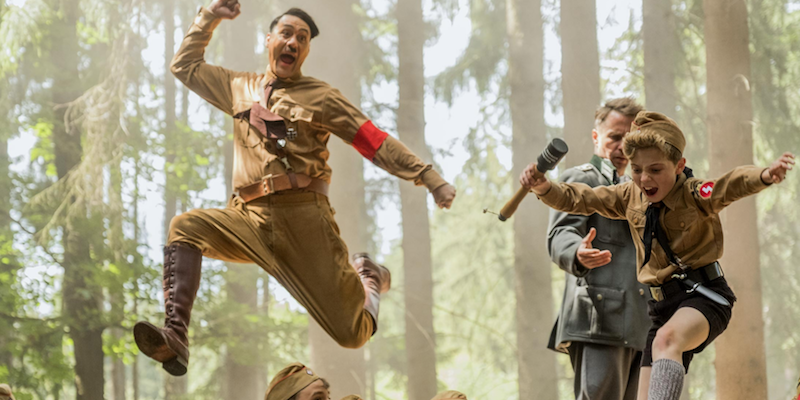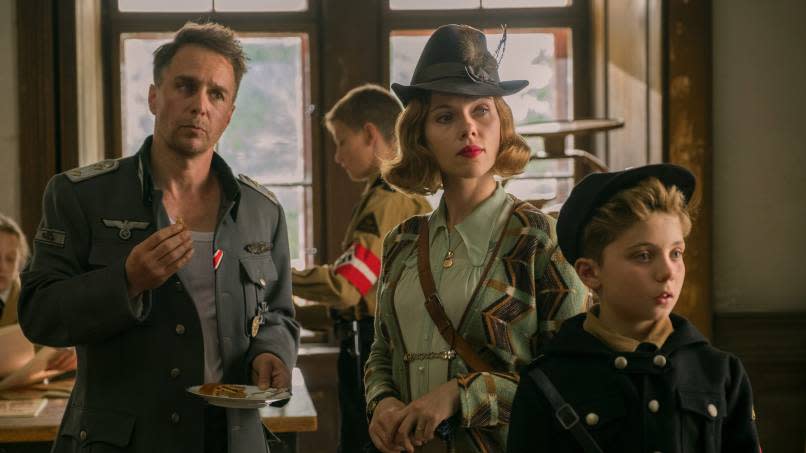Film Review: Jojo Rabbit Is A Heartfelt and Hilarious Nazi Coming of Age Comedy
The post Film Review: Jojo Rabbit Is A Heartfelt and Hilarious Nazi Coming of Age Comedy appeared first on Consequence of Sound.
This review originally ran in September as part of our TIFF 2019 coverage.
The Pitch: In this adaptation of Christine Leunens’ novel, 10-year-old Jojo (Roman Griffin Davis) is a devout Nazi supporter living with his single mother Rosie (Scarlett Johansson) in Germany during the second World War. His mother worries about her anxious, self-serious child who, aside from his friend Yorki (Archie Yates), only has an imaginary friendship with Adolf Hitler (Taika Waititi).
On a weekend retreat for Hitler youth, Jojo is disfigured in a freak grenade accident. While recovering from his injuries, he discovers a teenage girl, Elsa (Thomasin McKenzie), living in a hidden room in his deceased sister’s room. Jojo makes it his mission to write a book about Jewish people, using (mis)information provided by Elsa.
Naturally, the more time that the young boy spends with the teen girl, the more they grow to like and trust each other, despite the looming danger of being discovered.

Funny Nazis: It’s important to acknowledge that despite the inherently problematic premise of the film, Jojo Rabbit is very clearly a comedy about a young boy coming of age. Jojo’s reverence for Nazism is frequently acknowledged by his mother as a disconcerting issue and the portrayal of the Nazis, particularly Sam Rockwell as Captain K and Rebel Wilson as Fräulein Rahm, verges on farce. In Jojo Rabbit, Nazis are outright mocked, presented as buffoons or, using modern sensibilities, lampooned for their ridiculous principles.
Inappropriate Humor: The careful balance of tone is immediately apparent in the opening scene, as Adolf gives Jojo a pep talk before the retreat with a dance and increasingly loud proclamations of “Heil Hitler.” It’s simultaneously offensive and horribly inappropriate, but also quite funny in a sublime way.
Throughout the film, the Nazi salute is a hilarious running gag (the joke nicely undercuts how inane it is to address large groups when the salute must be given to each individual person). Meanwhile, the general lack of knowledge about the Jewish people, which could propagate tired stereotypes, winds up focusing instead on sublime ridiculousness.
The criticism of the Nazis’ utterly cluelessness about the people that they claim to despise is obvious, but the suggestion that Jews have horns, mind control powers, and sleep upside down like bats delivers the political commentary with an apt dose of comedy.

Coming of Age: Jojo Rabbit works principally because it is filtered through the perspective of a 10-year-old. Despite his quippy comebacks, debate skills, and an enviable vocabulary, however, Jojo is quite obviously still a child. There are even repeated character gags about his inability to tie his own shoes, snap his fingers, or wink properly.
By exploring the events of WWII through the eyes of a child (something other texts such as The Book Thief and The Boy In The Striped Pajamas also do), the film is granted more leeway to color outside of the lines of what would normally be acceptable. In this case, Jojo is presented as a mature child, but a child nonetheless, which partially defangs the horrific Nazi rhetoric that he espouses.
Contemporary audiences will understand immediately that Jojo is actually the one who has been brainwashed; they will understand how his mother is attempting to do right; and they will clearly see that the Nazis whom Jojo looks up to are mean, bigots, and/or idiots.
Using Elsa as a narrative foil — and a beacon of education — is another obvious narrative ploy, but that doesn’t diminish its effectiveness. Elsa is granted a few scenes with Rosie (independent of her interactions with Jojo) and the conversations about hope, the will to go on, and what it means to become a woman helpfully (re)frames the girl as both a Holocaust survivor and a teenager.

Hitler and The Boy: Easily one of the film’s greatest assets – and likely its biggest talking point – is the director’s portrayal of Adolf Hitler. In this iteration, the leader of the Third Reicht is contextualized through Jojo’s eyes, so in Jojo Rabbit he becomes an infantilized adult. He is prone to big ideas, big reactions, and loud outbursts. As the figurehead for a great deal of idiocy, this Hitler (whom the mysterious SS agents claim has four testicles) eats unicorn for dinner, frequently dives out of windows, and dances inappropriately. It’s a juvenile depiction that Waititi clearly relishes.
Of course, the real star of the show is Griffin Davis, who balances Jojo’s childlike wonder and horribly mistaken beliefs with just the right dose of saccharine sweetness. His has good chemistry with both Johansson and McKenzie, while his (briefer) interactions with Rockwell, Wilson, and particularly Yates (the film’s secret scene stealer), are all comedic gold.
Real Stakes: Despite the comedy and the cuteness, Waititi’s script never fails to acknowledge that Jojo Rabbit is still a film about Nazis, Jews, and the second World War. In this capacity, the director has a savvy sense of timing with regard to balancing the film’s tone, particularly in the last act. As the emotional and personal stakes for the characters rise as a result of a fairly significant casualty, the comedy is more or less dropped in order to showcase the horrors of war.

As Jojo becomes caught in the Allied battle to conquer Germany, buildings explode, peasants are killed in the street, and Jojo himself is nearly marked for death by US troops because he is wearing a German jacket. It is not entirely self-serious (Wilson thrusting children with explosives strapped to their backs is some gallows humor), but there is never a point where the film apologizes for Nazi rhetoric or the reality of war.
People die in this film and it’s no laughing manner.
The Verdict: Waititi’s witty script and colorful supporting role as Adolf Hitler are the obvious comedic highlights of Jojo Rabbit. But the film only works because it manages to nail its balance of tones. In the end, Waititi goes well past the obvious hook of Funny Hitler by delivering a surprisingly emotional and hilarious look at how two children lean on one another to maintain their humanity.
Where’s It Playing? The comedic take on the Third Reicht will debut in theaters October 18th.
Trailer:
Film Review: Jojo Rabbit Is A Heartfelt and Hilarious Nazi Coming of Age Comedy
Michael Roffman
Popular Posts

